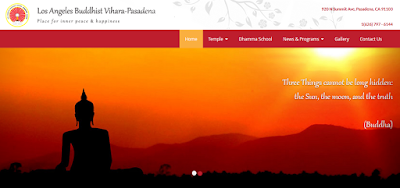Ajahns Lee, Suwat, Chah via Ven. Sujato; Ellie Askew, Dhr. Seven (ed.), Wisdom Quarterly
 |
| Dharma Meditation Initiative, Los Angeles: Thursdays, 7:00-8:30 PM, Pasadena |
 |
| Dharma Meditation Initiative - MARC.ucla.edu - Meetup.com/Zen-007 |
.
 |
| Meditation is letting go. |
(Ajahn Lee) We're taught not to hold onto concepts -- the names and labels we have for things. Let's let ourselves be "poor." Why?! It's when we are poor that we become ingenious and resourceful. If we never let ourselves be poor, we'll never gain wisdom/discernment.
In other words, we don't have to be afraid of being poor, stupid, or missing out on things.
In other words, we don't have to be afraid of being poor, stupid, or missing out on things.
 |
| The ajahns (Thai teachers) know. |
We don't want any of the insights we've gained by reasoning and thinking, because they're concepts and are therefore impersonal (not self).
Let all of these insights disappear -- because they are disappointing -- leaving just mind, firmly intent, leaning neither toward self-torment/being displeased nor toward self-indulgence/being pleased.
Keep the mind still, quiet, neutral, impassive -- set upright and tall, and there we are: right concentration.
Why meditation?
Keep the mind still, quiet, neutral, impassive -- set upright and tall, and there we are: right concentration.
Why meditation?
 |
| Breath-control (pranayama) in yoga |
If we meditate in order to “get” something, that’s craving manifesting, which will always disappoint, since craving is a cause of great suffering. Meditation isn't about craving.
The Dharma (the Truth the Buddha rediscovered) is already here. All we have to do is study and put it into practice so that we’ll know it (at theoretical and practical levels).
The ultimate Truth isn’t something new. It’s something that’s been here from time immemorial.
The root causes
 |
| Nature as religion, outdoors as our cathedral |
We’d better get a tractor and plow it up, but we put it off. It’s like saying to ourselves, “Should I go today? Should I? Maybe I’ll go tomorrow.” Then the next day, “Should I go or shouldn’t I?” And we keep on doing this day after day until we die. We never go anywhere. We’ve got to think, “Go!” and that’s it.
Strategic qualities of mind
 |
| Can I fix the world or fix my heart and mind? |
We pick one object of meditation -- “This is what I’m going to fasten on” -- then we keep it in mind, staying well aware of it. When we refuse to let it fall away, when we hold a single object, it becomes the quality called "singleness of mind."
When this singleness of mind arises, it can cut through restlessness, cut through anxiety. It includes mindfulness and persistence and can keep the mind firmly gathered in one place (samadhi).

















































































































































































































































No comments:
Post a Comment